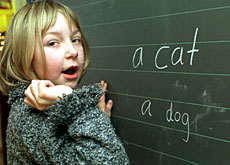Bridging the language divide

At the heart of multilingual Switzerland, high up in the Swiss parliament, sits a small team of interpreters whose job it is to bridge the language divide.
To mark the European Day of Languages on Friday, swissinfo spent a day with them in the capital, Bern.
Looking down from a couple of small booths overlooking the chamber of the House of Representatives, parliament looks half empty, even though the regular autumn session is in full swing.
Below us, a parliamentarian is addressing the House, but no one appears to be interested in what she has to say.
The majority of parliamentarians are taking a break in the lobby. Only the most conscientious ones remain at their desks; some read the newspapers, talk to their colleagues or amble around the chamber.
In the cabin next door, Viviane Vaucher is probably the only one listening carefully to the speech below. Sitting in front of a microphone and wearing headphones, Vaucher is translating simultaneously from German into French.
Siumultaneous translations in German and French are provided continuously during parliament’s four regular sessions by six interpreters.
Swiss-German
It is badly needed, because multilingual Switzerland, with its four national languages (German, French, Italian and Romansh) and two non-official languages (Swiss-German dialect and English), is a myth.
The reality is that very few Swiss speak at least three languages fluently.
“Only a small group of politicians are fluent in more than one language,” says Richard Bucher, one of the interpreters.
”Some clearly even have difficulties expressing themselves in their mother tongue. Take the majority German speakers, for instance: it is a bit of a challenge for some of them to even speak High German properly.”
“They use flawed syntax, make grammatical mistakes and often speak with a coarse accent and intonation. I would organise a course in proper speaking if I wasn’t so old,” says Bucher.
Ten languages
As for the interpreters, they belong to the elite, affirms Bucher, who himself is fluent in ten languages.
“But this is not unusual in our group,” he says. “It’s almost considered the norm.”
“For the moment, though, the simultaneous translation service is only available in Switzerland’s two main languages, German and French. But from next year, it will be extended to include Italian, once three new colleagues have joined us.”
And it’s a lucrative business: interpreters work 45-minute shifts, four to eight times a day, at a flat rate of about SFr1,100 ($820).
“We have a contract for up to 55 days a year with the federal authorities,” says Bucher.
Lucrative business
Bucher also works for the European Parliament and the Council of Europe in Strasbourg, when he’s not on duty in the Swiss capital, Bern. He also finds time to teach at a school for interpreters in Zurich.
The number of certified interpreters in Switzerland is relatively small. Some 300 students begin studies every year, but only five per cent make it through to graduation.
Oddly enough, politicians make little use of the service, says Bucher. But he suggests this is not because the overwhelming majority understand what is being said in other languages.
“I would say many parliamentarians feel ashamed to admit that they depend on a translation,” says Bucher.
swissinfo with agencies, Marzio Pescia (translation: Urs Geiser)
Switzerland has four official languages: German, French, Italian and Romansh.
Some 64% speak the Swiss-German dialect, 20% French, while Italian is spoken by about 6.5% and Romansh by a small minority of 0.5%.
There are only an estimated 100 experienced interpreters in Switzerland working in German or French.
In 1991 parliament decided to set up simultaneous translations in German, French and Italian. But because of a shortage of money, currently only translations into German and French are available.

In compliance with the JTI standards
More: SWI swissinfo.ch certified by the Journalism Trust Initiative












You can find an overview of ongoing debates with our journalists here . Please join us!
If you want to start a conversation about a topic raised in this article or want to report factual errors, email us at english@swissinfo.ch.